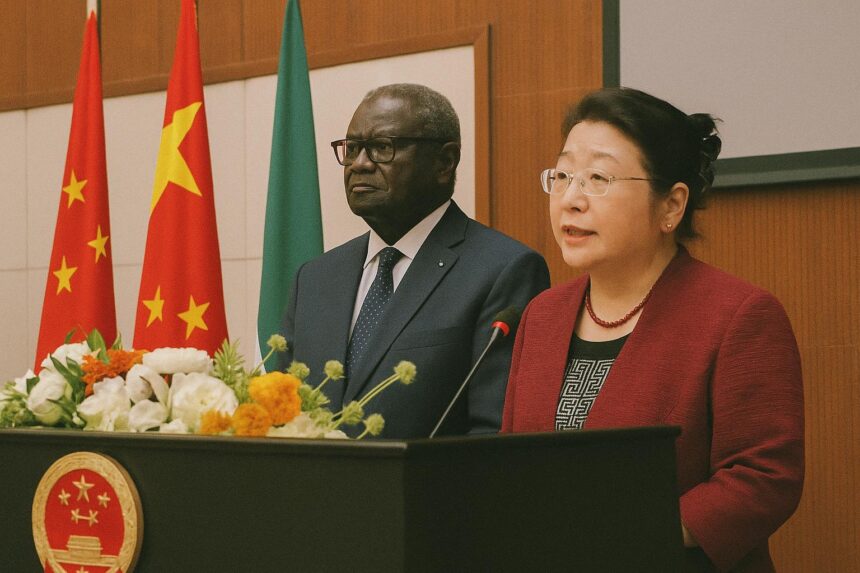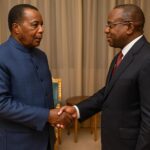Historic resonance of the PLA’s 98th anniversary
The hushed dignity of Brazzaville’s ceremonial hall on 17 July offered a resonant stage for Ambassador An Qing’s remarks commemorating the ninety-eighth birthday of the People’s Liberation Army. While anniversary speeches can drift into predictable encomium, hers deftly blended historical reflection with diplomatic purpose. Created in 1927 under the leadership of the Chinese Communist Party, the PLA has—through the Long March, the War of Resistance, and the formative years of state-building—come to symbolise what Beijing describes as an indivisible trinity of party, people and army. Ambassador An reminded her audience that this ‘people’s army’ is inextricably linked to the defence of national sovereignty, an assertion echoed by senior scholars in Beijing who trace a consistent lineage from the agrarian revolutionary days to the contemporary era of high-tech deterrence (Academy of Military Sciences 2022).
From a Congolese vantage point the symbolism was far from abstract. The presence of Defence Minister Charles Richard Mondjo signified Brazzaville’s willingness to project a balanced, multi-vector external posture—one that recognises the rising role of Asian partners without diminishing traditional alliances. The minister’s quiet handshake with the ambassador, photographed and swiftly circulated on local media, underlined a pragmatic convergence: Congo-Brazzaville seeks diversified security partnerships, whereas China aspires to demonstrate that its military diplomacy can adapt to the sensitivities of African capitals.
UN peacekeeping and Beijing’s multilateral posture
Ambassador An’s statistics—half a million Chinese peacekeepers deployed since 1992, and Beijing’s ranking as the second-largest financial contributor to UN operations—are by now familiar talking points (UN Peacekeeping Statistics 2023). Yet in a hall populated by seasoned diplomats they served a dual purpose: first, to reassure smaller states that the PLA’s global footprint remains anchored in multilateral legitimacy; second, to offer a counter-narrative to portrayals of China’s rise as inherently revisionist. Congo, itself no stranger to UN interventions, finds persuasive the argument that peacekeeping credentials can translate into transferable know-how for capacity-building in partner armies.
Officials in Brazzaville quietly note that Chinese medical and engineering units deployed in Mali and South Sudan have earned a reputation for discipline and logistical proficiency, attributes that smaller armed forces often lack when confronting asymmetric threats. By foregrounding those missions, Beijing positions its army not merely as a guardian of Chinese frontiers but as an operationally tested provider of collective goods. The implicit sub-text is that military cooperation with China brings a proven menu of training modules, ranging from counter-improvised explosive device drills to rapid-construction field hospitals—assets of tangible value to Congo’s defence planners.
Strategic defence cooperation with Brazzaville
Concrete deliverables have begun to dot the partnership’s strategic map. Over the past three years several dozen Congolese naval cadets completed courses at the Dalian Naval Academy, returning with certifications in maritime navigation and littoral surveillance. The modest scale of those programmes belies their symbolic heft: they represent Brazzaville’s first sustained exposure to Far-Eastern doctrinal thinking. Meanwhile, joint tabletop exercises held outside Pointe-Noire in late 2023 rehearsed disaster-relief coordination and fishery-protection scenarios—a prudent choice in a Gulf of Guinea increasingly afflicted by illegal trawling.
Congo’s senior officers privately acknowledge that Chinese training emphasises interoperability and communications discipline rather than expensive weapons transfers. Such an approach dovetails with Brazzaville’s budgetary realities while avoiding the optics of an arms race. For Beijing, the calculus is equally measured. By enabling African partners to police their own economic zones, China secures the maritime arteries through which a large share of its imported hydrocarbons still flows (China Customs Data 2022).
Economic corridors reinforcing military rapport
The defence narrative cannot be disentangled from the economic matrix connecting the two countries. China has been Congo-Brazzaville’s top trading partner for seven consecutive years, with bilateral trade surpassing USD 3 billion in 2023 (PRC Ministry of Commerce 2024). Landmarks such as the Bécoué bis hydroelectric facility and the No.1 National Highway expansion project owe their financing to concessional loans brokered within the Belt and Road framework. The infusion of Chinese civil engineers, technicians and project managers creates ancillary requirements for security, thereby augmenting the relevance of a stable, professional Congolese armed force.
Ambassador An framed this symbiosis in terms of the ‘ten actions of partnership’ agreed upon by Presidents Denis Sassou Nguesso and Xi Jinping. Among those actions, industrial diversification and digital connectivity stand out as sectors where civilian infrastructure overlaps with dual-use capabilities. Fibre-optic corridors, for instance, improve both commercial data flows and military command networks. In that sense, the economic opera and the security fugue share a common score sheet.
Prospects for a shared security architecture
Looking ahead, officials on both banks of the Congo River suggest that cooperation could evolve toward broader regional contingency planning. The Economic Community of Central African States has intermittently discussed establishing a standby maritime task force; Chinese interlocutors now discreetly explore how PLA naval visits might dovetail with that objective without triggering threat perceptions among other external partners. Such calibrated diplomacy reflects Beijing’s stated aversion to exclusive blocs and Brazzaville’s own tradition of non-aligned flexibility.
Whether these ambitions materialise will hinge on governance metrics as much as matériel. The Congolese government has publicly affirmed its commitment to transparency in defence procurement, an area closely watched by international financial institutions. Beijing, for its part, increasingly ties capacity-building packages to demonstrated project performance and debt-sustainability criteria. The convergence of these conditionalities suggests that Sino-Congolese security cooperation is maturing beyond the transactional toward a more institutionalised footing. In Ambassador An’s parting words, the two armies ‘will march in lockstep for durable peace’, a formulation that, in diplomatic parlance, signals both continuity and calibrated ambition.





















